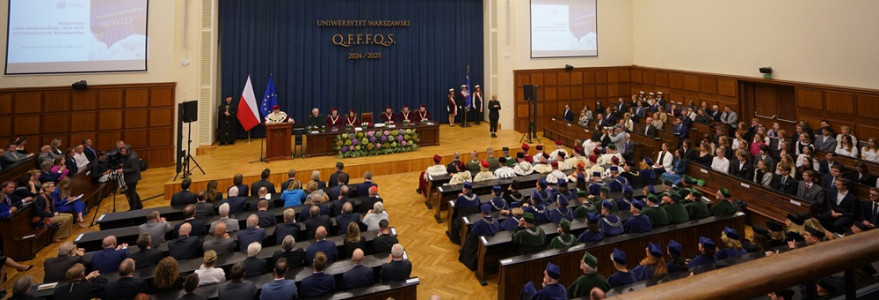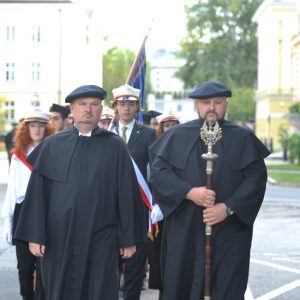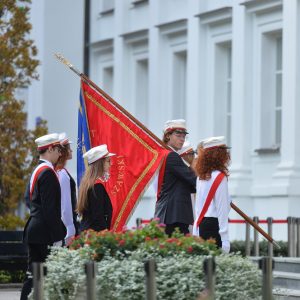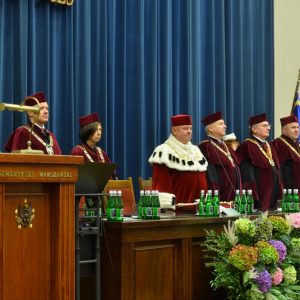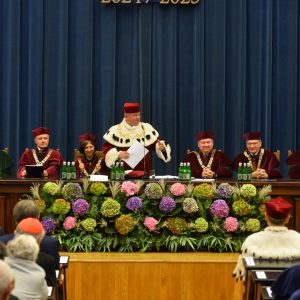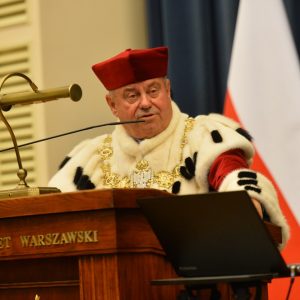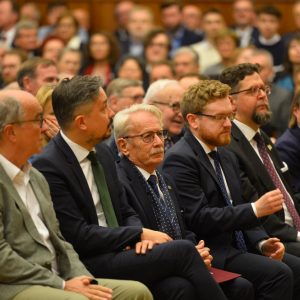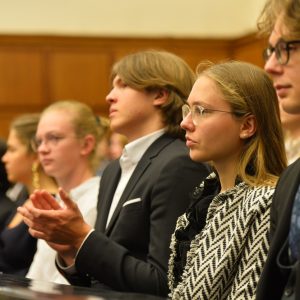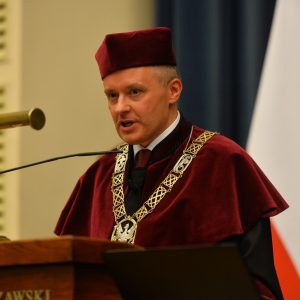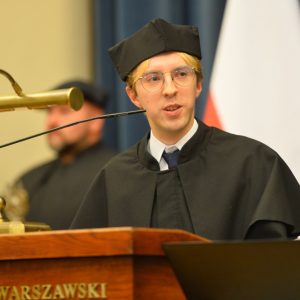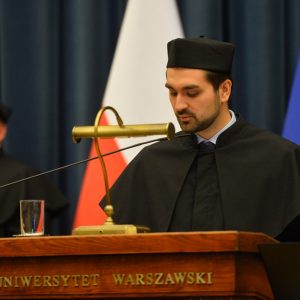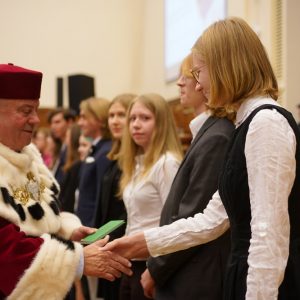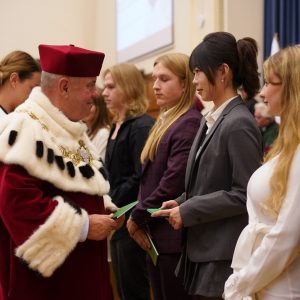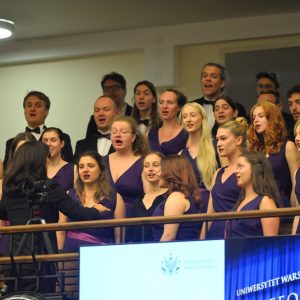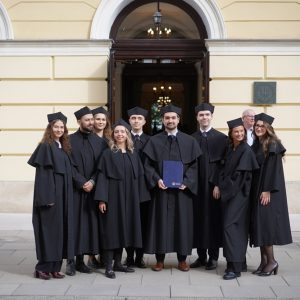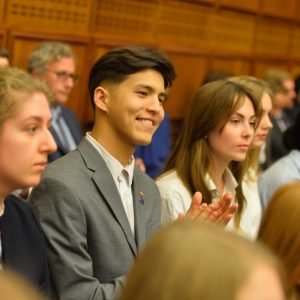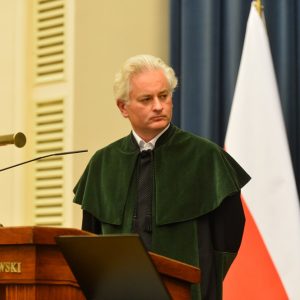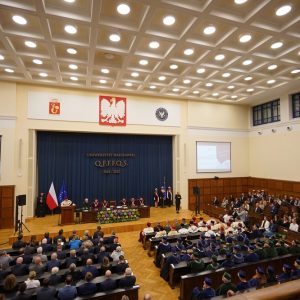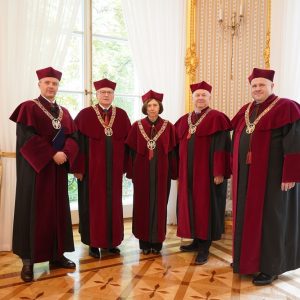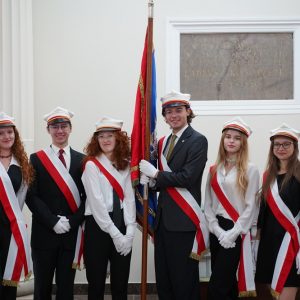“This is a festive celebration for the University. I wish you all the best. Have far-reaching dreams and consistently achieve them,” said Prof. Alojzy Z. Nowak, the UW Rector, in an opening address, welcoming new students and doctoral candidates during the inauguration of the 2024/2025 academic year. The event was held on 1st October in the Auditorium Maximum building on the main campus at Krakowskie Przedmieście.
The University of Warsaw inaugurated the new academic year on 1st October. The University authorities and members of the Senate walked grandly from Kazimierzowski Palace to the Auditorium Maximum on the historical campus at Krakowskie Przedmieście, where the official part of the ceremony took place in Adam Mickiewicz’s Hall. Following the national and European anthems, the ceremony was opened by Prof. Alojzy Z. Nowak, the Rector of the University of Warsaw.
“It is an honour to welcome all of you. We are extremely proud that you have chosen the University of Warsaw to shape your lives and your future here. You have made an excellent choice. The UW is a place where you can gain knowledge from the best, and freely present and defend your thoughts. It is a place where you will always be heard,” the UW Rector said. “At the University of Warsaw, everyone can be fully themselves. Our community is committed to respecting the dignity and freedom of all its members regardless of beliefs, culture or religion. It is a place for everyone, a universal institution. Our responsibility is to uphold the respect for other people,” he added.
One community
The UW Rector stressed that a precious value at the University is the sensitivity of the student and doctoral community: “We encourage our young people to think critically and ask difficult questions. Development is a result of such conversations. However, we cannot approve the usage of freedom of one against the other. Therefore the decisions, to restrict free movement on the campus and the closure of the University gates. As of tomorrow, they will be open. I hope we have all learned the lessons from past incidents and we will cooperate.”
Prof. Alojzy Z. Nowak mentioned a scholarship programme for Palestinian students and a series of seminars explaining the challenging problems of today’s world.
“You become part of our academic community, whose members have significant scientific achievements. We are united by friendship and collaboration. Our community comprises almost 40,000 students and doctoral candidates, almost 9,000 employees and ca. 11,000 associates. We are a community of thousands – each with its dreams, ambitions and beliefs. Here, at the University, you will find answers to many questions. You will be able to study at universities from all around the world, which cooperate with us, too. In September, we took over the one-year presidency of the 4EU+ Alliance, which we are forming together with Sorbonne University, Charles University in Prague, Heidelberg University, the University of Milan, the University of Geneva, the University of Copenhagen, and Paris-Panthéon-Assas University. We are a university that is defined by continuity of activities. We continue the best practices also started by our predecessors, ”the UW Rector said.
The UW Rector also emphasised the importance of social aspects. The development of the resident halls and faculty residence halls (DPN), the construction of a sports centre, and new faculty buildings under the Multiannual Programme are crucial. He also drew attention to the high level of scientific research at the UW and the importance of cooperation with business partners, including the recently established international partnership within the framework of Poland in the Silicon Valley Center for Science, Innovation, and Entrepreneurship.
“This is a festive celebration for the University. I wish you all the best. Have far-reaching dreams and consistently achieve them,” said Prof. Alojzy Z. Nowak, the UW Rector, addressing the newly admitted students and doctoral candidates.
Solemn matriculation
The Rector’s speech was followed by the matriculation ceremony marking the formal admission of students and doctoral candidates to the University of Warsaw community. First- and second-cycle students and doctoral candidates who obtained the best results in the admissions process will take the oath.
Mateusz Mossakowski, the President of the UW Student Council, and Piotr Paszkowski, the UW PhD Students’ Union representative, delivered speeches.
“The University of Warsaw is not only a place to study or to conduct research. It is also a diverse community full of passion and open to new ideas. We should not be afraid to reach for more. The study time at the UW is unique not only to acquire education, but also to build relations, and responsibility for the world around us. In the Student Council, we aim to make each of you feel supported, as well as to impact the life of our University. Do not hesitate to take advantage of this opportunity. I wish us all that this year will be full of inspiration, discovery and success. May every moment spent at the University of Warsaw bring us closer to our dreams and goals. Let us remember that the University is more than just the buildings. It is, above all, the people who create it,” Mateusz Mossakowski said.
“The core of the University is the community, its people: researchers, academics, administrative staff, students, doctoral candidates, their unions and their self-government. You join a community of experts and scientists who conduct their research at the highest level and share their results. You are the future of this University,” said Piotr Paszkowski.
Revolution or curiosity
The inaugural lecture on the role of artificial intelligence in science (Revolution or curiosity. What role will AI play in science?) was delivered by Prof. Piotr Sankowski from the Faculty of Mathematics, Informatics and Mechanics at the University of Warsaw, a scientist who was the first in Poland to win four prestigious European Research Council grants. Prof Sankowski’s research interests concern the design and analysis of fast approximation algorithms for problems where a computer solution is impossible due to very time-consuming calculations.
“There are many definitions of artificial intelligence. My favourite is the classic one, which says that AI is the stimulation of human intelligence processes by machines, especially computer systems. We train neural networks to be able to adapt to something more complex. Networks are becoming more and more complex. Large language models understand natural language as well as humans do. Deep neural networks can generate images. Thanks to the generative artificial intelligence tools, we can all be more creative,” Prof Sankowski pointed out.



